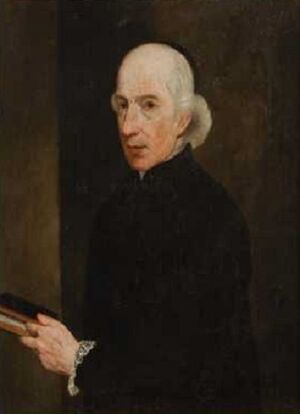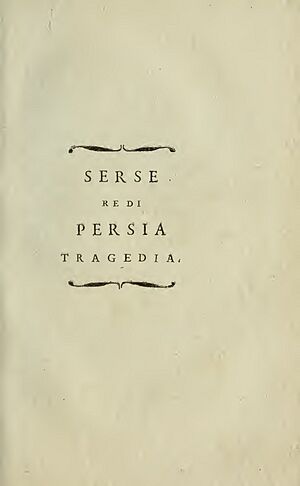Saverio Bettinelli facts for kids
Quick facts for kids
Saverio Bettinelli
|
|
|---|---|

Portrait of Saverio Bettinelli by Domenico Conti Bazzani, 1800
|
|
| Born | July 18, 1718 Mantua, Duchy of Mantua
|
| Died | 13 September 1808 (aged 90) Mantua, Kingdom of Italy
|
| Nationality | Italian |
| Other names | M. Versajo Melasio Diodoro Delfico |
| Occupation |
|
| Parent(s) | Girolamo Bettinelli and Paola Bettinelli (née Frugoni) |
| Academic background | |
| Influences | |
| Academic work | |
| Era | |
| Discipline | Literary criticism, italian studies, Medieval studies |
| Institutions | University of Modena |
| Influenced |
|
Saverio Bettinelli (born July 18, 1718 – died September 13, 1808) was an Italian writer and a Jesuit priest. He was known for being good at many things. He wrote plays, poems, and was a literary critic. He was friends with famous writers like Voltaire and Vincenzo Monti.
Contents
Life of Saverio Bettinelli
Saverio Bettinelli was born in Mantua, Italy. He studied with the Jesuits in Mantua and later in Bologna. In 1736, he joined the Jesuit order. He became a priest in 1738.
Early Teaching Career
From 1739 to 1744, Bettinelli taught literature in Brescia. There, he met many important scholars. After Brescia, he moved to Bologna to study theology. He connected with other writers and thinkers there.
Professor and Traveler
When he was 30, Bettinelli became a professor of rhetoric in Venice. In Venice, he wrote a poem called Le raccolte (1751). This poem suggested new ideas for Italian poetry. He wanted poetry to be interesting for both experts and regular people.
In 1751, he took charge of a college for noble students in Parma. He taught poetry and history there for eight years. During this time, he also traveled to other Italian cities for his order.
Journeys and Famous Friends
Between 1755 and 1758, Bettinelli went on several trips. In 1755, he traveled to Germany. He later returned to Italy to teach the sons of a prince. The next year, he went to France with one of his students. During this trip, he wrote his famous Lettere dieci di Virgilio agli Arcadi.
Bettinelli also wrote arcadic poems, which are simple poems about nature. He wrote tragedies for the Jesuit theater, like Gionata (1774) and Serse (1764). In 1758, he visited King Stanisław Leszczyński in Lorraine. The king sent him to meet Voltaire. In France, he also met Jean-Jacques Rousseau.
Later Life and Writings
Bettinelli returned to Parma in 1759. He then lived in Verona and Modena for some years. He was appointed a professor of rhetoric in Modena. However, in 1773, the Jesuit Order was shut down in Italy. This meant Bettinelli had to leave his teaching job.
He went back to his hometown of Mantua and focused on writing even more. When the French army attacked Mantua, he moved to Verona. There, he became close friends with Ippolito Pindemonte.
Literary Criticism
Bettinelli is well known for his literary criticisms. In 1757, he wrote letters to Virgil where he criticized Dante Alighieri's Divine Comedy. He believed only a small part of it was truly great. Voltaire actually liked these unusual opinions.
In 1766, he wrote Lettere inglesi, which discussed good taste in modern literature. His work Dell'entusiasmo delle belle arti (1769) talked about how excitement helps artists create. He also wrote an important book about the progress of literature, science, and arts in Italy after the year 1000. This book was called Risorgimento negli studi, nelle, Arti e ne' Costumi dopo di Mille (1773).
In 1797, Bettinelli returned to Mantua. Even at almost 80 years old, he continued to work and live his usual life. In 1799, he started putting together a complete collection of his works. This collection was published in Venice in 24 volumes. He died at the age of 90, still full of energy and a lively mind.
Works
- Opere edite ed inedite in prosa ed in versi. Seconda edizione riveduta, ampliata, e corretta dall'Autore, 24 volumes, revised and enlarged edition, Venice: Cesare, 1799-1801.
 | Sharif Bey |
 | Hale Woodruff |
 | Richmond Barthé |
 | Purvis Young |


